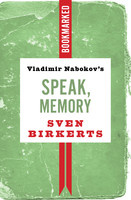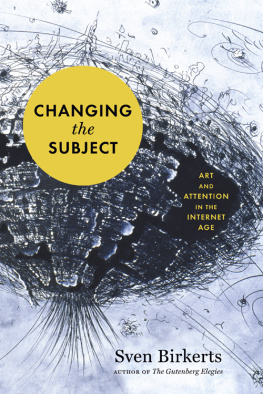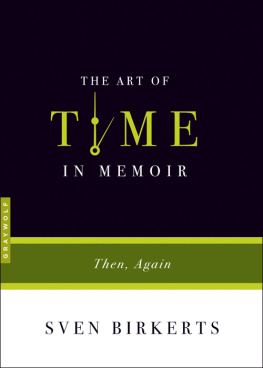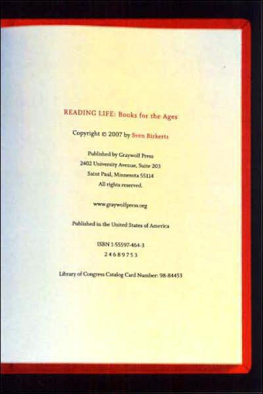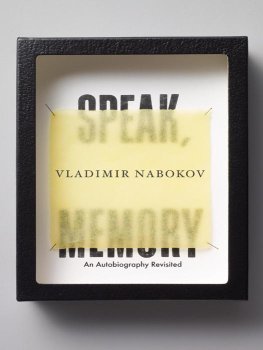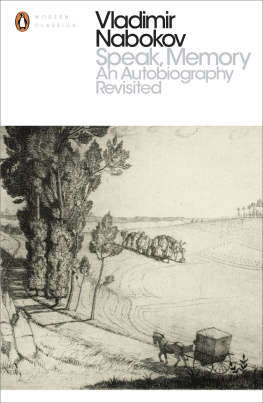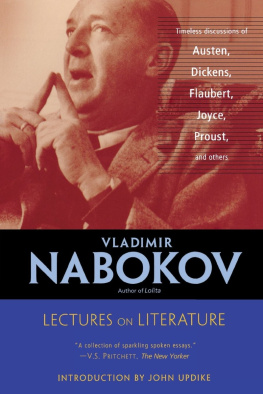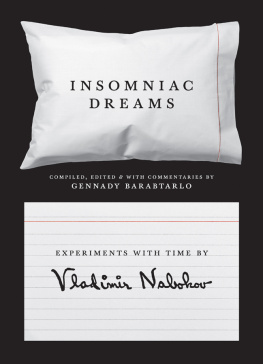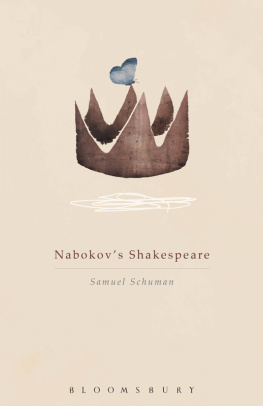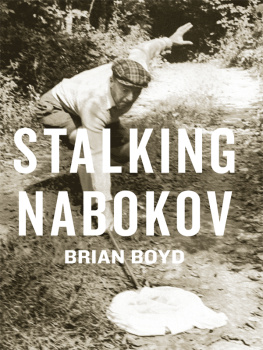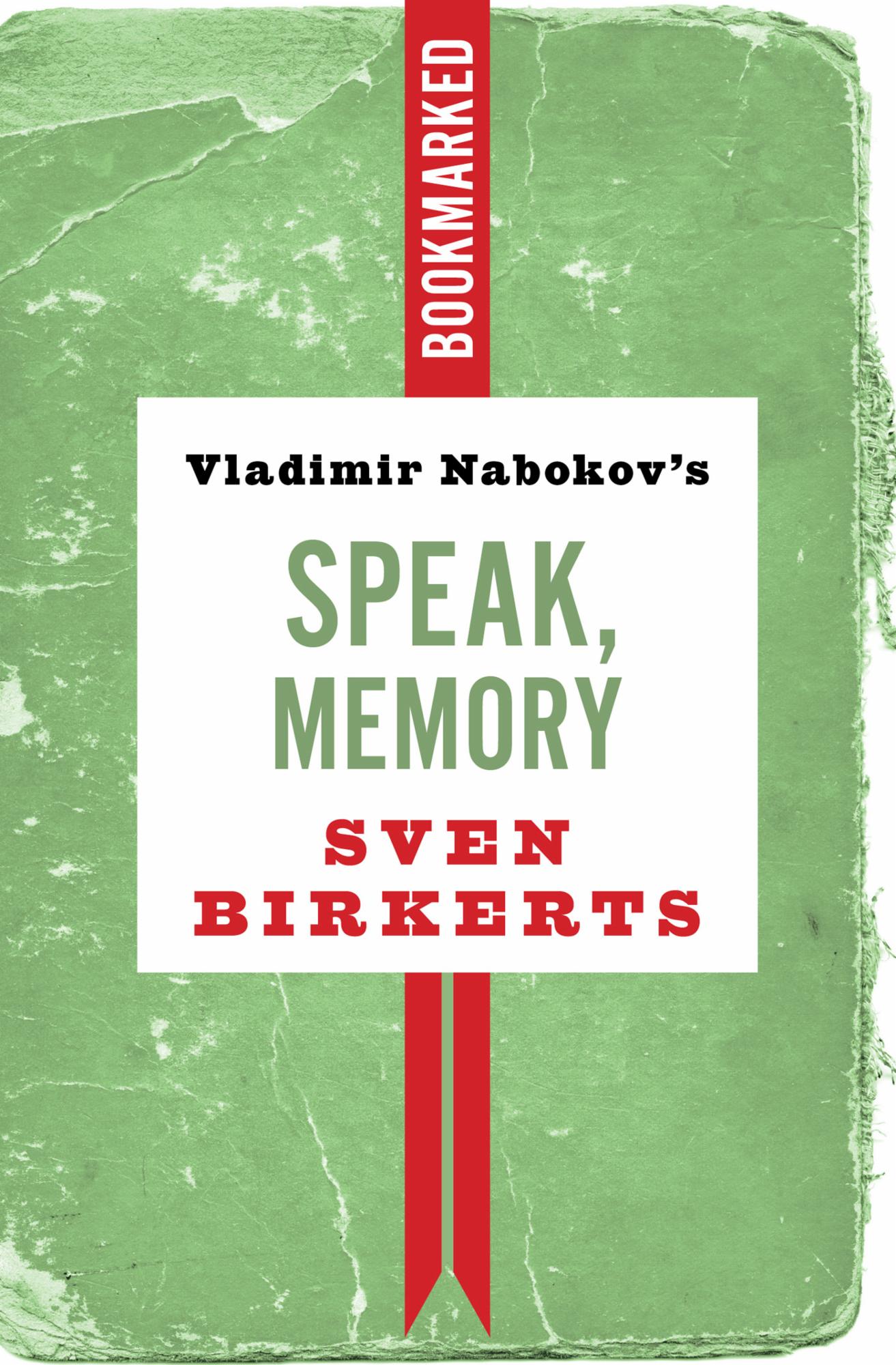
Speak, Memory: Bookmarked
Vladimir Nabokovs
Speak, Memory
BOOKMARKED
SVEN BIRKERTS
Copyright 2020 by Sven Birkerts.
All rights reserved.
No part of this book may be used or reproduced in any manner without written permission of the publisher. Please direct inquires to:
Ig Publishing
Box 2547
New York, NY 10163
www.igpub.com
ISBN: 978-1-63246-108-7 (ebook)
For my familyLynn, Mara, and Liamand for my mother, Sylvia, who keeps the sense of the long-ago world fresh for me.
In reality, every reader, while he reads, is the reader of himself. The writers work is only a kind of optical instrument which he offers to the reader so that he might make out what, without this book, he might perhaps not have seen in himself.
Proust
Contents
Note
Prologue
Nabokovs Memoir
Childhood and Memory
Exile
Scales of Mattering
The Soul Inside the Sentence
Metaphor
Family Photos
The Muse Visits
The Collector
The Old Questions: Theres Nothing Like Them
The Shape of a Life
The ersistence of Memory
Persona and Person
Coda: Concluding Unscientific Postscript
Speak, Memory
Coda: Fact-Checking the Memoirist
Acknowledgments
Note
when i finally decided that Speak, Memory would be the book I would write about in a personal and also reflective way, I had to settle on what felt like the right approach. I have been an admirer of Vladimir Nabokov since I first came upon Lolita in my early twenties. And though I came to the memoir a few years later, I had by then read a number of his novels, along with his various lectures on literature. And my head was full of Nabokov lore: from interviews, critical essays, and incidentals from the literary gossip mill. But this was to be a short book, not a study, and I feared I would lose myself in tangents if I tried to say everything I wanted to about the man.
My best bet, I thought, was to write just about Speak, Memory. I would, as much as possible, approach it as an isolated texteven though I knew I would not be able to avoid occasional outside references, either to what I knew of the life, or else to my reading of other works. I would not read any background on the memoir, and would not make use of what insightful things others have said.
Once I had set my constraints, I held to them. I did not wander far afield and I have very rarely quoted any one else on anything. But when I had finished said what I had wanted to say, I could not resist checking in with other sources, especially Brian Boyds deeply researched and detailed two-volume biography. It was in Boyd that I found the memoirist contradicted in certain telling ways. And while my approach did not allow me to go back to mix my reading with extraneous findings these posthumous insights could not be ignored altogether. They shed interestingand importantlight on the memoirists psychology and were very relevant to many things I had been exploring.
I have therefore added a few of these other insights as a kind of appendix. While they dont significantly change my assessment, they do invite the reader to elasticize her views on Nabokovs presentation, his fidelily to what really happened. The upshot, not surprisingly, is that he was a writer who favored the spirit of the law over its letter.
Prologue
i was having lunch last summer in a seafood restaurant in Newport, Rhode Island when I unexpectedly got the itch. I had just taken part in a panel discussion about literary magazines and editing, and my co-panelists and I were eating oysters and calamari and making post-talk small talk about our projects. At one point, the woman who was hosting us mentioned that she was at work on a book-length-project about a book that had been influential in her life. There was a publisher, she said, dedicated to select one-book explorations that combined the personal and the literary.
I dont perk up easily, but now I did. Reading books has been the main through-line in my life. I spent many years as a bookseller and book dealer before I tried my hand at reviewing. After some years of that, I started writing longer and more reflective essays on authors and books. Then still more years later, I published a short book called Reading Life: Books for the Ages, in which each essay recounted my reading experience with a different novel. I had so many favorites to choose from. I ended writing about just a few, like The Moviegoer, To the Lighthouse, The Ambassadors, and Lolita. Each novel had marked my life in some special way. I very much enjoyed approaching these novels from a more personal angle, but I also realized that the essay form was just not roomy enough. I ended each reflection with the feeling that there was so much more to be said.
Hearing about this series naturally excited me. I began scheming as soon as I started my drive back to Boston. And when I got home, I looked up the publisher right away and wrote to ask if they were still accepting pitches. I had my reply a few hours later: what book did I want to propose?
Now, after all this eager haste, I had to pause and give the matter some serious thought. There are, like I said, a number of books that I feel have been decisive in my lifebooks that reshaped my outlook and sometimes even affected my course of action. At seventeen, as suggestible as a college freshman can be, I read Henry Millers Tropic of Cancer and spent months planning how I would expatriate myself to Europe. D. H. Lawrences Women in Love all but defined my romantic outlook in high school. Julio Cortazars Hopscotch fi ed my early writing ambitions How would I decide?
Thinking in terms of a proposal, I turned the beam of my attention this way and that, trying to imagine what book I would be interested in writing about in that personal/literary way, and at some length. Memoirs of Hadrian, The Alexandria Quartet, To the Lighthouse ? My list got longer the more I contemplated.
Unable to decide, I thought to work from the other direction. Instead of thinking about one book or another, I would concentrate on my inclinations and preoccupations, trying to isolate what basic themes I am now most compelled by in my own life. Thebook I chose would have to offer me the best pretext for delving there. When I put the question that way, the answer came almost immediately: Vladimir Nabokovs Speak, Memory. I had no second thoughts, and I knew why. Nabokov, more than any writer Id readeven more than Proust, Id saywas obsessively occupied with time, with memory, and with the search for meaningful patterns in his life.
Time, memory, patternsmy choice was not surprising. These are my own themes, too. The older I get the more these questions come alive in my thoughts. They have long since moved from conjecture to immediacy. And though reading is often considered to be a passive activity, real engagement with a book is anything but. Here, with the choice of Nabokov, what had started as an itch looked to become something much more serious, something more like what Walker Percy called a search, an inner project of some urgency.
And thenit almost goes without sayingthere was the dark delight of Nabokovs prose. Language used with such inventive accuracy is its own consideration, even as it creates and carries the content. Im a sucker for a masterful style, never mind that, as Nabokov observed on the very first page of
Next page
